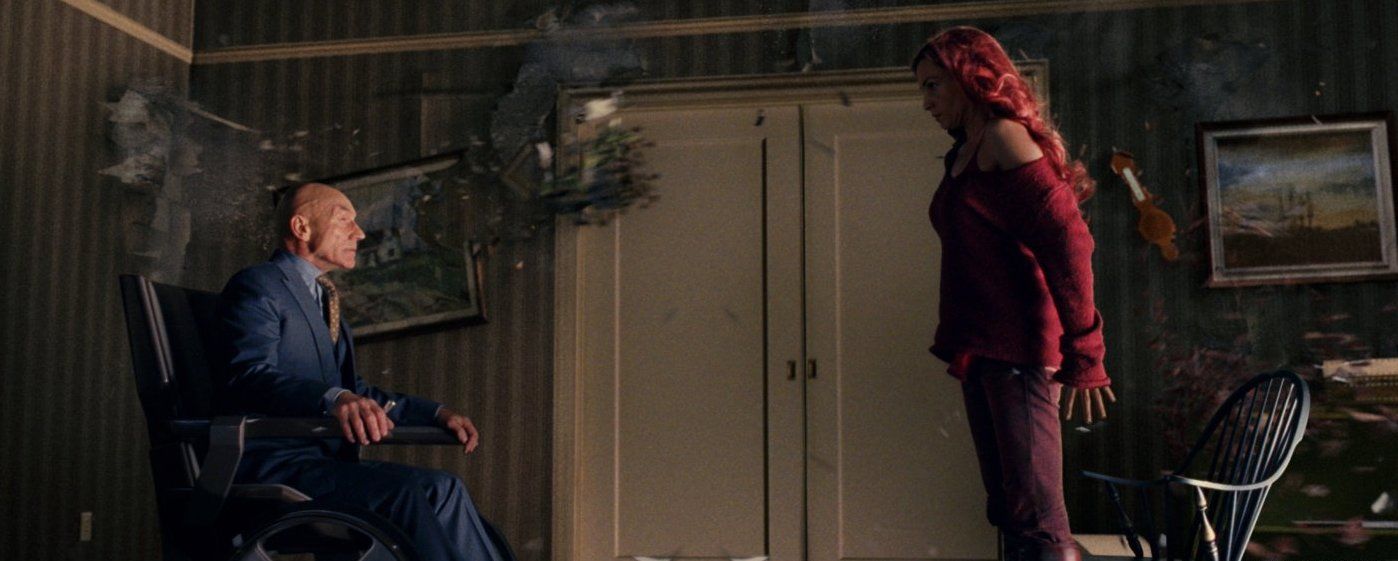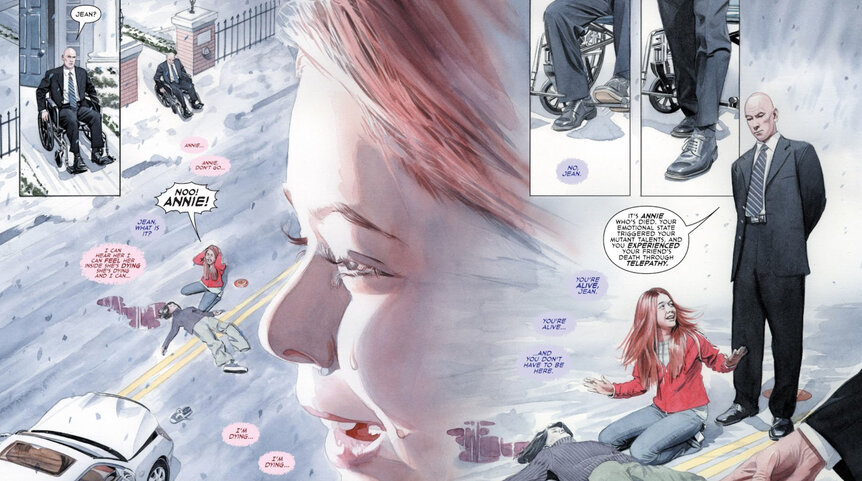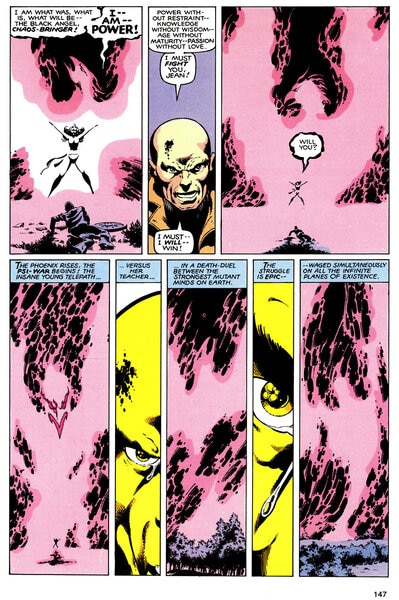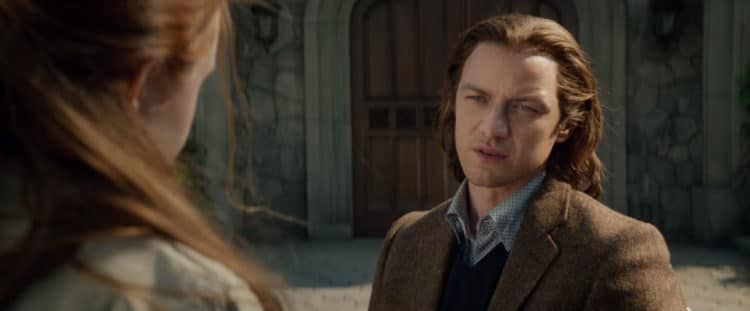Create a free profile to get unlimited access to exclusive videos, sweepstakes, and more!
Why reducing Jean Grey to a teaching moment for Xavier is a mistake

Charles Xavier has many compelling one-on-one mentorships with several of his students, helping mutants like Rogue, Gambit, and Wolverine learn to control their rampaging psyches and use their powers for good. Still, the relationship between Jean Grey and Xavier has always been one of the most unique. In comics, they went from a questionable teacher/student dynamic to full-on peers. Jean is one student who unquestionably surpassed her mentor, developing abilities far beyond his own.
Still, in the wake of this year's Dark Phoenix, it is also true that their interactions have been far from healthy. Even in the comics, there has always been an element of fearfulness and perhaps underlying jealousy toward Jean on the part of Xavier. Dismayed by her awesome abilities as much as he did yearn to aid her, Xavier helped Jean greatly, but he also went way too far and violated her mental state while doing so. In placing his vision of the world at the forefront and Jean’s own right to live somewhere in the background, Xavier made a lot of mistakes in his life, but one of the most glaring has been his treatment of the young woman who sometimes goes by the name Phoenix.
In the BeginningComics continuity tells us that Charles Xavier first discovered Jean when he sensed her awesome psychic presence via his mutant-tracking device known as Cerebro. Jean’s mind was dormant after she had witnessed her best friend die in a car accident. As a telepath, Jean not only saw the event but also felt the death in her mind, which shattered her ability to cope. Walking a line in her own subconscious between death and life, the first time she lived up to her future name of Phoenix was when she rose from her coma with the assistance of a concerned Xavier.
Joining her teacher at his school in Manchester, New York, Jean was a late bloomer in comparison to the other students. She struggled with her abilities despite being infinitely more powerful than her teammates. There have been various explanations as to why that might be, but in the movie continuity, we are to believe that Xavier had suppressed the imminent rise of her powers because they scared him at his core. In comics, the Phoenix is a separate entity entirely, but it is highly likely Xavier put up mental barriers preventing Jean from accessing the trauma that had left her immobilized for quite some time in her youth. With this retroactive knowledge, looking back at Jean struggling to access her powers and being unable to do so is absolutely heartbreaking.
Even with Phoenix as an external entity, Xavier’s attempts to control Jean were a failure. During the Dark Phoenix Saga, he fought to contain the immensely powerful Phoenix in what he believed to be Jean Grey’s mind. Succeeding only by the grace of her willingness to end the fight, Xavier was temporarily triumphant but ultimately failed to save his student, who died at the end of the storyline from her own guilt.
Rising From The Ashes
Jean Grey and Xavier both experienced quite a lot over the years they were apart. Jean and Phoenix were revealed not to have been the same entity, and we discover Jean had been gestating in a cocoon for years at the bottom of Jamaica Bay, ignorant of the terrible events above. When Jean returned, she was sucked into the sprawling storyline of Inferno, in which we discover Cyclops had married her clone in the form of Madelyne Pryor. Pryor had been engineered in the image of Jean Grey by Mister Sinister, who attempted to control Cyclops from afar through her. Madelyne, meanwhile, was tragically unaware that she had been created to do nothing more than love the man who eventually went back to the woman she had been cloned from. Driven beyond despair, Madelyne joined with demonic forces to become the Goblin Queen while the Phoenix presence lingered in both her and Jean's life. In the end, Jean merged with both entities psionically to create a healthier whole image of herself. In this way, Inferno was incredibly important, because it was the storyline in which Jean Grey, finally, after decades in the Marvel universe, regained her autonomy, and she did so under her own strength of will.
Meanwhile, Xavier had spent much time in deep space after many tragedies, failures, and catastrophes on Earth. Traveling the cosmos with his lover, the Shi’ar Princess Lilandra, he had much time to grow and reflect upon his many mistakes. When he finally returned to Earth, he and Jean began a much more equal friendship at the Xavier Institute. His manipulations of her ceased for the most part, and they both stood soundly on their own ground.
In many ways, over this time period and into the present, Jean has always been the most devout believer in Xavier’s dream. While Cyclops was bound to his position at the school by virtue of having no real family of his own and a sense of overwhelming gratitude to Xavier for giving him a life's purpose, he later went in directions that were intrinsically at odds with Xavier’s belief that mutants and humans must live in peace with one another. While Cyclops eventually became a bit of an extremist and a mutant separatist, Jean died and returned from the dead once more to lead her own team of X-Men. While much of the X-Men’s missions under Cyclops’ lead over the last many years had been based on the eradication of their enemies, Jean Grey immediately began building bridges all over the Marvel Universe. While Cyclops was an X-Man out of necessity who lost much of his faith along the way, Jean persistently worked on forgiveness and community-building. Obviously, they both have ample reasons behind their choices, but it should be noted that Jean has always remained committed to her morality in a way the other original X-Men have not.
The Movies and Dark PhoenixIn X-Men: The Last Stand, Jean Grey seemingly returns from the dead, accidentally killing Cyclops in her first moments of reappearance. Xavier then casually admits that he had put up barriers in Jean’s mind, fracturing her persona and essentially leading to the problem at hand. Wolverine tries to call him out on this, but Xavier snaps that Wolverine is nothing more than an animal, displaying a very contentious inability to take extremely justified criticism. Of course, Jean ultimately kills Xavier in a confrontation that probably shouldn't have happened to begin with, then ends up destroying herself due to her inability to regain control.
The Last Stand is not particularly well loved by either comic or movie fans, though this more cynical take on Xavier would gain traction in the following years. While in the comics he was generally depicted as a good man of many failures, the dark side of his personality became overtly prominent here, as did his willingness to experiment on his own students with a complete lack of accountability for his devastating effect on Jean's psychic well-being.
Xavier is not always portrayed positively, but his relationship with Jean is complex and fascinating. At their best, it is extremely interesting to watch the way they communicate with one another. Xavier commands the other X-Men while Jean blithely refuses to be ordered around. Ignoring his status as one of the great pro-mutant activists of her time, Jean sees him as the flawed old man who both saved her life but also caused her a great deal of pain. The unconditional forgiveness Jean shows to the extremely stubborn Xavier has always felt complicated and real, and when writers reduce this intricate synergy developed over many decades of storytelling to a raw abuse of power, it shows a lack of imagination and an inability to grasp the complexities in play.
One of the great selling points on Jean Grey as a character has always been her sense of autonomy and her complete refusal to acknowledge her own limitations in life. This is also very true of Xavier, and in this way we can see how Jean is, more than any of her peers, the logical heir to Xavier’s dream. She is not, nor has she ever been, a mere morality tale for Xavier to chew on, and by showing her helplessly struggling against his control, we see a side of Xavier that is not just unlikable but very nearly completely unforgivable. When male authority figures treat vulnerable women like this in real life, they cross several ethical lines. This error in judgment renders much of Xavier’s moralism completely meaningless, and it does the same to Jean Grey’s long journey to becoming her own person.
In Dark Phoenix, Xavier's tampering with Jean’s subconscious is a major cause for the development of the Phoenix. Though it is important to call powerful men out for abuses of power, reducing Jean Grey’s fascinating comic book persona to a simple teaching moment for Charles Xavier has been the most prominent issue with the films and their portrayal of Jean. By robbing her of her sense of autonomy and attributing even her own mental health issues to being nothing more than a byproduct of Xavier’s hubris, writers have long done a disservice to Jean by flattening her to nothing more than a consequence of a male character’s actions.
The views and opinions expressed in this article are the author's, and do not necessarily reflect those of SYFY WIRE, SYFY, or NBC Universal.

















